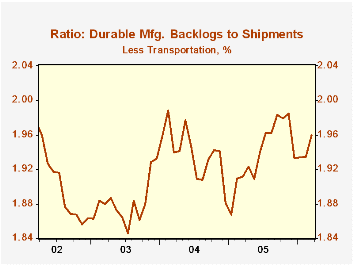 Global| Apr 26 2006
Global| Apr 26 2006U.S. Durable Goods Orders' Rise = Factory Sector Resilience
by:Tom Moeller
|in:Economy in Brief
Summary
New orders for durable goods jumped 6.1% last month and the 3.4% February increase was upwardly revised. The jump pulled the y/y increase in orders to 17.7%, its strongest in six years, and the m/m gain by far outpaced Consensus [...]

New orders for durable goods jumped 6.1% last month and the 3.4% February increase was upwardly revised. The jump pulled the y/y increase in orders to 17.7%, its strongest in six years, and the m/m gain by far outpaced Consensus expectations for a 1.8% rise. Moreover, the details of the report were constructive for factory sector activity.
During the last ten years there has been a 69% correlation between the y/y change in durable goods orders and the change in output of durable goods.
Higher orders for nondefense aircraft & parts led last month's strength with a 71.1% (329.3% y/y) spike that followed the 59.9% February spurt. And new orders for motor vehicles & parts reversed the prior month's decline with a 2.8% (4.2% y/y) rise.
Less the transportation sector altogether, durable goods orders rose 2.8% which more than made up for a little revised 1.1% decline during February.
Orders for computers & electronic products were notably strong last month and posted a 7.5% (7.4% y/y) gain while machinery orders recouped about all of the prior month's decline with a 7.5% (16.3% y/y) increase. Also strong were orders for fabricated metals which increased 1.3% (7.1% y/y) and orders for primary metals rose 1.1% (8.5% y/y). Electrical equipment orders were the laggard last month and fell 1.8% (+13.2% y/y) after a 4.1% February drop.
Orders for nondefense capital goods jumped 12.1% with higher Boeing orders but orders less aircraft still increased 3.0% after a 0.8% February decline that was shallower than initially reported.
During the last ten years there has been an 87% correlation between the y/y change in capital goods orders less aircraft and the y/y change in business fixed investment in equipment & software from the GDP accounts.
Shipments of durable goods increased 0.3% (7.6% y/y) following a 0.4% February rise and less the transportation sector shipments were unchanged (8.1% y/y) following a 0.4% February increase. During the last ten years there has been an 82% correlation between the y/y change in durable goods shipments and the change in industrial production of durable goods.
Order backlogs surged 2.8% (20.9% y/y), a jump dominated by the strength in unfilled orders for aircraft & parts which rose 6.6% (70.6% y/y). Less transportation backlogs also were strong and rose 1.3% (10.8% y/y) lifting the ratio of backlogs to shipments outside of transportation to the highest level since November.
Durable inventories rose 0.7% (3.0% y/y) after a 0.4% February decline. Less transportation inventories rose an identical 0.7% (3.4% y/y) while the inventory to sales ratio outside of the transportation sector rose to the highest level since November.
| NAICS Classification | Mar | Feb | Y/Y | 2005 | 2004 | 2003 |
|---|---|---|---|---|---|---|
| Durable Goods Orders | 6.1% | 3.4% | 17.7% | 8.6% | 9.5% | 4.1% |
| Excluding Transportation | 2.8% | -1.1% | 9.6% | 8.6% | 11.7% | 3.1% |
| Nondefense Capital Goods | 12.1% | 4.0% | 31.5% | 20.0% | 11.0% | 4.2% |
| Excluding Aircraft | 3.0% | -0.8% | 11.8% | 10.7% | 9.5% | 4.8% |
Tom Moeller
AuthorMore in Author Profile »Prior to joining Haver Analytics in 2000, Mr. Moeller worked as the Economist at Chancellor Capital Management from 1985 to 1999. There, he developed comprehensive economic forecasts and interpreted economic data for equity and fixed income portfolio managers. Also at Chancellor, Mr. Moeller worked as an equity analyst and was responsible for researching and rating companies in the economically sensitive automobile and housing industries for investment in Chancellor’s equity portfolio. Prior to joining Chancellor, Mr. Moeller was an Economist at Citibank from 1979 to 1984. He also analyzed pricing behavior in the metals industry for the Council on Wage and Price Stability in Washington, D.C. In 1999, Mr. Moeller received the award for most accurate forecast from the Forecasters' Club of New York. From 1990 to 1992 he was President of the New York Association for Business Economists. Mr. Moeller earned an M.B.A. in Finance from Fordham University, where he graduated in 1987. He holds a Bachelor of Arts in Economics from George Washington University.
More Economy in Brief
 Global| Feb 05 2026
Global| Feb 05 2026Charts of the Week: Balanced Policy, Resilient Data and AI Narratives
by:Andrew Cates






